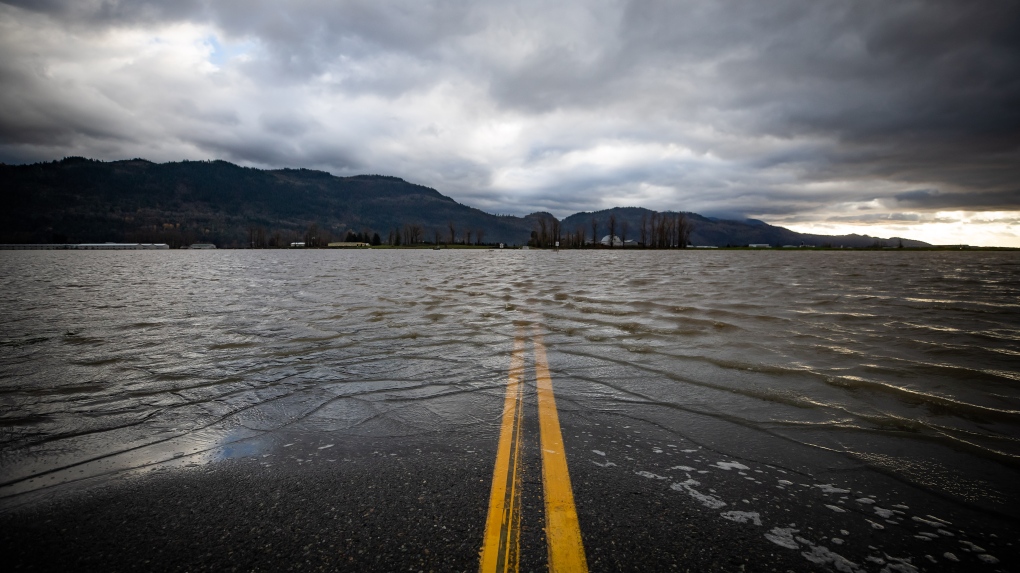Better forecasting, warnings could protect B.C. from natural disasters, engineers say
 Floodwaters cover a road that runs through farmland in Abbotsford, B.C., Tuesday, Nov. 23, 2021. THE CANADIAN PRESS/Darryl Dyck
Floodwaters cover a road that runs through farmland in Abbotsford, B.C., Tuesday, Nov. 23, 2021. THE CANADIAN PRESS/Darryl Dyck
A panel of engineers says better forecasting and co-ordination could help prepare British Columbia for natural disasters, while they warn the spring thaw and rain may compound damage caused by recent floods.
The experts from the University of British Columbia shared their preliminary observations Wednesday on November's floods, with geotechnical engineer Jonathan Fannin warning that snowmelt in the spring could add new pressure to dikes, highways and bridges.
“I think it's in the back of our minds as the next expected demand on our system,” he said.
Spring thaws were responsible for the most catastrophic flood events in the Fraser Valley before the flooding this fall, Fannin said. They more commonly affect the Fraser River, not the Sumas River, which spilled onto farmland in Abbotsford, B.C.
In Merritt, a town of 7,000 that was ordered to evacuate last month, spring thaws are responsible for about 70 per cent of flood events, though they tend to be less severe than fall flooding, said Steven Weijs, an expert on hydrological modelling.
“Now we're, of course, in a special situation because we have damaged infrastructure, which is more vulnerable,” he said.
Transportation engineer Amy Kim says there are also lessons from the floods that can be applied to protect critical infrastructure, including proactively closing highways or planning other routes.
When it comes to preparations, Fannin said British Columbia can learn from places like Hong Kong and Rio de Janeiro, where centralized warning systems protect the public from hazards and storms.
In Hong Kong, for example, he said residents receive alerts to stay home and avoid driving when a natural hazard is detected.
With more extreme weather events possible, he said B.C. could benefit from integrating landslide and debris flow forecasting with river and atmospheric monitoring to protect critical infrastructure.
“I think we're going to have to see a steps change in our ability to anticipate events coming, issue warnings and co-ordinate across a series of disciplinary areas,” Fannin said.
Scott McDougall, who specializes in geohazard mitigation, said British Columbia's hazard response has typically been fragmented.
“These risk-based decisions are made at individual sites for individual hazards,” he said, noting the panel itself was an example of how hazard experts from different fields could come together and “cross-pollinate.”
Weijs said that rivers cover such large areas that planning can only be done effectively through holistic studies that look at not only the strength of the dikes, for example, but spatial planning.
“I definitely think this should be addressed at a large-scale, interdisciplinary level led by government,” he said.
Dharma Wijewickreme, a geotechnical engineer with expertise in pipelines, added that assumptions 30 years ago may not apply today. With weather patterns changing as well as human development and activity affecting the landscape, adapting infrastructure is an evolving process, he said.
This report by The Canadian Press was first published Dec. 15, 2021.
CTVNews.ca Top Stories

BREAKING Toronto MP and former Liberal cabinet minister Marco Mendicino won't seek re-election
Marco Mendicino, a prominent Toronto member of Parliament and former minister of public safety and immigration, won't run in the next federal election, CTV News has learned.
U.S. soldier shot self in head before Cybertruck exploded outside Trump's Las Vegas hotel, officials say
The highly decorated U.S. Army soldier inside the Tesla Cybertruck that burst into flames outside U.S. President-elect Donald Trump's Las Vegas hotel shot himself in the head before the explosion, officials said Thursday.
Wayne Osmond, singer and guitarist for The Osmonds, is dead at 73
Wayne Osmond, a singer, guitarist and founding member of the million-selling family act The Osmonds, who were known for such 1970s teen hits as "One Bad Apple," "Yo-Yo" and "Down By the Lazy River," has died. He was 73.
Toys "R" Us Canada closing 5 stores, expand HMV and add play spaces to some shops
Toys "R" Us Canada says it is closing five Ontario stores and revamping several others as it works to "optimize" its business.
FORECAST Weather warnings issued in 7 provinces and territories
Wintry weather conditions, including heavy snow and wind chill values around -55, prompted warnings in seven provinces and territories Thursday.
Rosita Missoni, matriarch of Italian fashion house that made zigzag knitwear iconic, dies at age 93
Rosita Missoni, the matriarch of the iconic Italian fashion house that made colorful zigzag-patterned knitwear high fashion and helped launch Italian ready-to-wear, has died. She was 93.
Apple to pay US$95M to settle lawsuit accusing Siri of snoopy eavesdropping
Apple has agreed to pay US$95 million to settle a lawsuit accusing the privacy-minded company of deploying its virtual assistant Siri to eavesdrop on people using its iPhone and other trendy devices.
When you should see a doctor and other health advice, according to a nurse
As many begin the new year with health resolutions, here's one nurse's advice on when to see the doctor, get tests and seek preventative care.
Possible scenarios that could play out in Ottawa as the Liberal government teeters
Prime Minister Justin Trudeau is said to be reflecting on his future over the holidays after the resignation of his top cabinet minister, Chrystia Freeland, in mid-December. The bombshell move prompted a fresh wave of calls for Trudeau to step down as Liberal leader from inside and outside the caucus.































